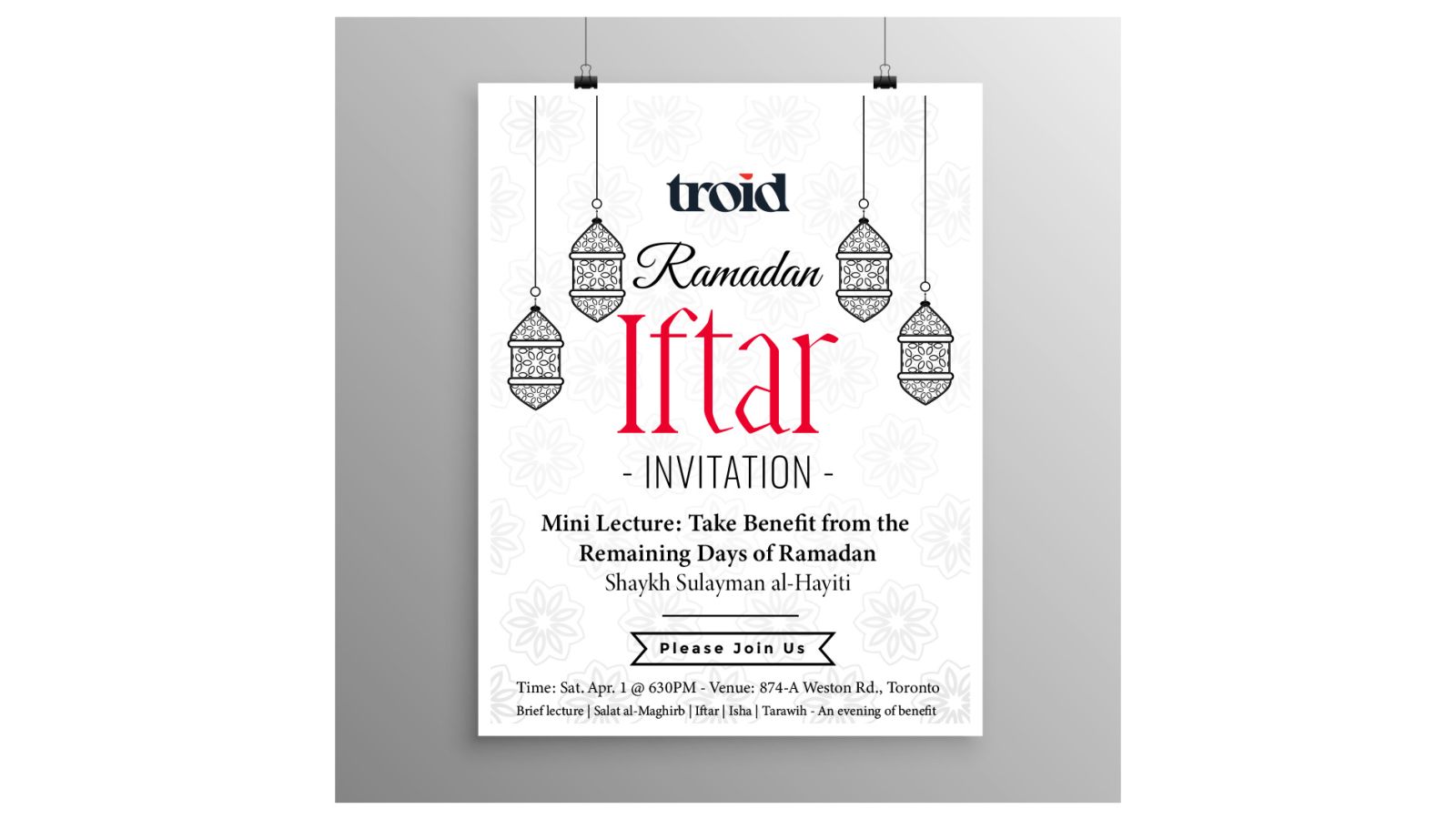Reviving A Forgotten Sunnah in Ramaḍān: Communal Saḥūr
Dr. Abū Wāʾil Musa Shaleem


Fasting in Ramaḍān is one of the greatest forms of worship, so much so that it was made a pillar of Islām. Consequently, Allāh legislated copious laws to ensure that we fast correctly, and not only were the early generations keen to implement these laws, but they were also keen to transmit them, as we will soon see. However, as time elapsed, many Muslims forgot about some of the more intricate laws of fasting this blessed month.
Although having ifṭār collectively is a common practice, the sunnah of consuming saḥūr[1] collectively is definitely a forgotten Prophetic tradition.
Zayd ibn Thābit (رضي الله عنه) said: “I had saḥūr with the Prophet (صلى الله عليه وسلم). He then stood to perform the prayer.”[2]
Badr al-Dīn al-ʿAynī (d. 855 AH) (رحمه الله) commented: “This Ḥadīth proves that eating saḥūr collectively is recommended.”[3]
Ḥudhayfah (رضي الله عنه) narrated: “I had saḥūr with Allāh’s Messenger (صلى الله عليه وسلم) very close to the time of dawn.”[4]
In fact, the Prophet (صلى الله عليه وسلم) would invite the Companions to have saḥūr with him. ʿIrbāḍ ibn Sāriyah (رضي الله عنه) reported: “I heard Allāh’s Messenger (صلى الله عليه وسلم) inviting people to have saḥūr (with him) in Ramaḍān. He (صلى الله عليه وسلم) said: ‘Come to the blessed morning meal/blessed breakfast [i.e. saḥūr].’”[5]
Shaykh Muḥammad Ādam Al-Ityūbī (رحمه الله) said: “This Ḥadīth proves that inviting others for saḥūr and eating it collectively is recommended.”[6]
ʿIrbāḍ ibn Sāriyah (رضي الله عنه) also said: “Allāh’s Messenger (صلى الله عليه وسلم) invited me to have saḥūr (with him) in the month of Ramaḍān. He (صلى الله عليه وسلم) said: ‘Come to the blessed morning meal/blessed breakfast [i.e. saḥūr].’”[7]
Khālid ibn Miʿdān (رضي الله عنه) relayed: “Allāh’s Messenger (صلى الله عليه وسلم) said to a man: ‘Come to the blessed morning meal/blessed breakfast [i.e. saḥūr].’”[8]
Actually, the Messenger (صلى الله عليه وسلم) and Zayd ibn Thābit (رضي الله عنه) had communal saḥūr because Zayd (رضي الله عنه) was invited. This was documented in another version of the Ḥadīth.
Anas ibn Mālik (رضي الله عنه) relayed:
Allāh’s Messenger (صلى الله عليه وسلم) said suḥūr time: “O Anas, I want to fast, so fetch me something to eat.” I brought him some dates and a vessel of water. That was after Bilāl’s adhān. He said: “O Anas, find a man to eat with me,” so I invited Zayd ibn Thābit (رضي الله عنه), who came and said: “I drank some sawīq because I want to fast.” Allāh’s Messenger (صلى الله عليه وسلم) said: “I also want to fast,” so Zayd ibn Thābit (رضي الله عنه) ate with Allāh’s Messenger (صلى الله عليه وسلم).[9]
Although Anas (رضي الله عنه) was present, he did not partake in the communal saḥūr. In another version of the Ḥadīth, Anas (رضي الله عنه) himself clarified this saying: “Allāh’s Prophet (صلى الله عليه وسلم) and Zayd ibn Thābit (رضي الله عنه) had saḥūr together.”[10]
Having communal saḥūr is not limited to the month of Ramaḍān, as is established in the Ḥadīth of ʿIrbāḍ ibn Sāriyah (رضي الله عنه), since the Ḥadīth of Anas (رضي الله عنه) suggests that the Messenger (صلى الله عليه وسلم) and Zayd ibn Thābit (رضي الله عنه) intended to fast an optional fast since a person intending to fast an obligatory fast does not typical use these expression: “I want to fast,” “I drank some sawīq because I want to fast,” and “I also want to fast.”
Regardless, having communal saḥūr is a Prophetic practice. Consequently, the Salaf were hasty to implement this established tradition. The Companion Sahl ibn Saʿd (رضي الله عنه) said: “I would have my saḥūr with my family. I would then hasten to attend the (Fajr) prayer with Allāh’s Messenger (صلى الله عليه وسلم) .”[11]
A) This Ḥadīth proves:
-
- Communal saḥūr was an established Islamic practice in the Prophet’s time since Sahl ibn Saʿd (رضي الله عنه) only practiced it because the Prophet (صلى الله عليه وسلم) established it
- Communal saḥūr includes the nuclear family eating collectively as Sahl ibn Saʿd (رضي الله عنه) and his family practiced it
Tragically, communal saḥūr, even within the nuclear family, is an abandoned Prophetic tradition since each family member usually prefers to eat their saḥūr alone.
B) The aḥadīth of Ḥudhayfah, ʿIrbāḍ ibn Sāriyah, and Khālid ibn Miʿdān (رضي الله عنهم) prove that the invitation for communal saḥūr extends beyond the nuclear family.
The senior tābiʿī Zirr ibn Ḥubaysh (رحمه الله) said: “I had saḥūr with Ḥudhayfah (رضي الله عنه). We then went to the masjid.”[12]
The senior tābiʿī Ṣilah ibn Zufar (رحمه الله) relayed a similar occurrence. He said: “I had saḥūr with Ḥudhayfah (رضي الله عنه). We then went to the masjid.”[13]
These last two narrations reveal the keenness of the Companions to practice the Protetic traditions and to teach others about about them as Ḥudhayfah (رضي الله عنه) himself had communal saḥūr with the Messenger (صلى الله عليه وسلم) then had it on two separate occasions with Zirr (رحمه الله) and Ṣilah (رحمه الله) from the tābiʿīn.
Therefore, we should try to revive this forgotten tradition, especially in the month of Ramaḍān, since the opportunity to do that then is greater since Muslims fast the entire month. This entails:
-
- Implementing it, as the Salaf did
- Reminding others about it, which is the main intent of this article, and whoever aids in the revival of a forgotten sunnah will reap a tremendous reward. The Prophet (صلى الله عليه وسلم) said: “Whoever revives a good practice that is then followed will receive its reward and a reward equivalent to that of those who follow it without that detracting from their reward in the slightest.”[14]
Endnotes:
[1] Saḥūr is the pre-dawn meal that is consumed in the blessed month of Ramaḍān prior to fasting. Suḥūr is the act of eating saḥūr, the pre-dawn meal. This is the exact difference between wuḍūʾ and waḍūʾ. Wuḍūʾ is the act of purifying one’s self. As for waḍūʾ, then it is the object that is used to purify one’s self: water. Therefore, the “u” signifies an action, while the “a” signifies an object connected to the action.
[2] Reported by al-Bukhārī (1921).
[3] ʿUmdah al-Qārī, vol. 10, pg. 299.
[4] Reported by Ibn Mājah (1695), and Shaykh al-Albānī deemed it authentic.
[5] Reported by al-Nasāʾī (2163), and Shaykh al-Albānī and Shaykh Muḥammad Ādam authenticated it.
[6] Dhakīrah al-ʿUqbá, vol. 20, pg. 358.
[7] Reported by Abū Dāwūd (2344), and Shaykh al-Albānī deemed it authentic.
[8] Reported by al-Nasāʾī (2165), and Shaykh al-Albānī and Shaykh Muḥammad Ādam authenticated it.
[9] Reported by al-Nasāʾī (2167), and Shaykh al-Albānī authenticated it.
[10] Reported by al-Bukhārī (576) with this exact wording.
[11] Reported by al-Bukhārī (577 and 1920).
[12] Reported by al-Nasāʾī (2153), and Shaykh al-Albānī and Shaykh Muḥammad Ādam graded it authentic.
[13] Reported by al-Nasāʾī (2154), and Shaykh al-Albānī and Shaykh Muḥammad Ādam graded it authentic.
[14] Reported by Muslim (1017).

















